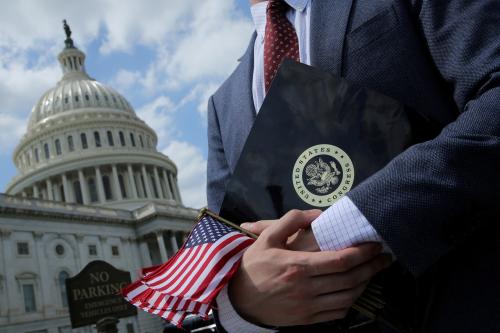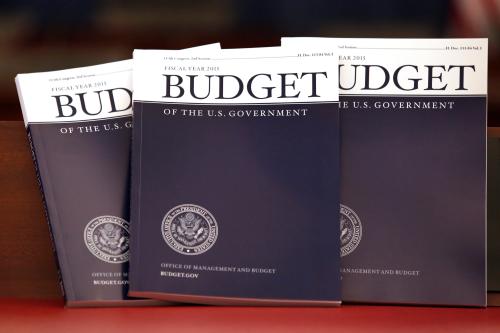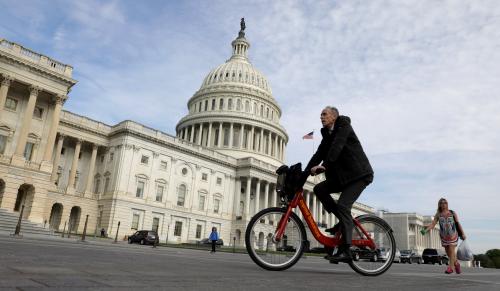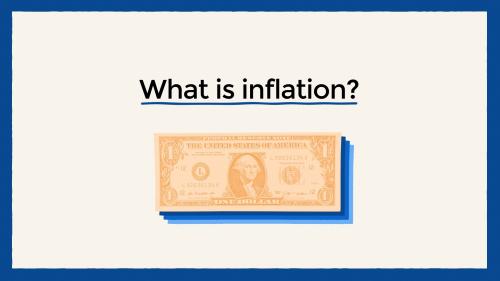This article originally appeared in Real Clear Markets on October 9th, 2019. Interested in learning more about how to engage millennials in long-term policy issues? Join us for a public event on October 22nd, 2019, “How millennials think differently about climate change and national debt: Lessons for policymakers,” co-hosted by the Brookings Institution and the Millennial Action Project.
On September 23rd I was unable to drive to work at the Brookings Institution because activists in Washington DC blocked key intersections. They were part of worldwide demonstrations designed to draw attention to climate change. Like my economist colleagues at Brookings, I was struck by the size and passion of these demonstrations. As I think about them, three things are particularly surprising about it to a Baby Boomer policy analyst like me.
The first is that there is such strong support, especially among younger Americans, for tough policies in climate change, even though the major threat is well into the future yet proposed policies mean economic pain today. The conventional wisdom in political science is that it is extremely difficult to generate public support for any pain-now/gain-later policy. Climate change defies that pattern.
The second curiosity is the heavy presence of Millennials and other younger Americans in the protests. We Baby Boomers constantly complain about the challenge of getting younger Americans to vote or take a serious interest in a range of problems facing the country. Yet climate change is very much a Millennial issue.
The third observation is the contrast between the passion among young Americans for action on climate change, and the giant Millennial yawn that greets any policy expert or politician trying to draw attention to the problem of surging deficits and national debt. Yet, like climate impact projections, the fiscal picture is dire. According to the bipartisan Congressional Office, federal debt held by the public is rising rapidly and will be close to 150% of GDP by 2050. That would easily surpass the previous record during World War II— with the growth fueled by long-term entitlement promises like Medicare and Social Security that are hard to change, rather than by short-term defense needs that can later be trimmed back. Even now, the debt tab for the average family of four is over $250,000. Economists of all political stripes worry about the potential consequences of such a “debt overhang”, from high inflation to sharp increases in interest rates and much slower growth. But while young Americans are increasingly concerned about college loan debt they feel personally, few are stirred to demand action to tackle the national debt, with its climate change-like threat to our economic and social future.
Why is this?
At Brookings, several colleagues and I* are trying to understand why young people react so differently to climate change and the national debt, even though both will affect them profoundly and both require urgent steps now to forestall serious damage in the future. Thanks to interesting work by a range of organizations, such as the Pew Research Center, the FrameWorks Institute, and the George Mason University Center for Climate Change Communication, it may be possible to glean some clues from climate change about ways to communicate with younger people about the fiscal problem.
For instance, it is important for Baby Boomers like me to remember something about Millennials and other young Americans. They may have experienced the short, sharp shock of the Great Recession, but they have not experienced the long periods of stagnant growth and grinding inflation that shaped our own concerns about debt. Few young Americans have any direct experience with significant inflation and high interest rates. So scary scenarios that bring back chilling and real memories for us, don’t elicit a visceral reaction from them. Meanwhile, they’ve seen devastating hurricanes and tsunamis and the disappearance of coral reefs. Climate change seems very real. Debt-triggered economic problems do not.
This generation of younger people also tends to look for ways to take action themselves, even when there are costs involved; they are less inclined to rely only on action by government and corporations. So, they are buying hybrids and reducing their carbon footprint in other ways. Perhaps fiscal reformers should put a lot more emphasis on personal actions that will make some difference, such as starting a regular savings plan or making lifestyle changes that will reduce future Medicare costs.
Furthermore, we must understand that, for Millennials, experts on climate change are more trusted and awarded more authority than experts on our fiscal problems. Despite the President’s Sharpie-wielding skepticism about the government’s own weather forecasting capabilities, the public—and particularly younger Americans—place great trust in the increasingly reliable short-term and long-term climate models they see journalists using on their TVs or iPhones. In contrast, economists and politicians advocating austerity plans do not have that vaunted status, in part because there is so much genuine argument about fiscal data and trends. The loud noise surrounding these arguments typically overwhelms the often-similar long-term fiscal picture and resultant threats portrayed by serious economists.
It is important, therefore, for all of us trying to build Millennial support for fiscal reform to emphasize the trustworthiness of institutions like the Congressional Budget Office, and to point out the relative consistency of competing fiscal models. We could learn a lot about this from the television weather forecasters, who now routinely use both the US and European weather models to show the probable track and intensity of storms and the range of serious opinion.
There is a lot of frustration among economists and policymakers about the seeming unwillingness of young Americans to appreciate the enormous threat posed by deficits and debt. Prophesying fiscal disaster and urging action is a challenging line of work these days. But understanding why Millennials respond to calls for action on climate change suggests there may be better strategies.
*A previous version of this op-ed used the word “we” instead of “several colleagues and I.” This phrase has been modified for purposes of clarity.







Commentary
Op-edWhy are millennials unfazed by the national debt?
October 9, 2019